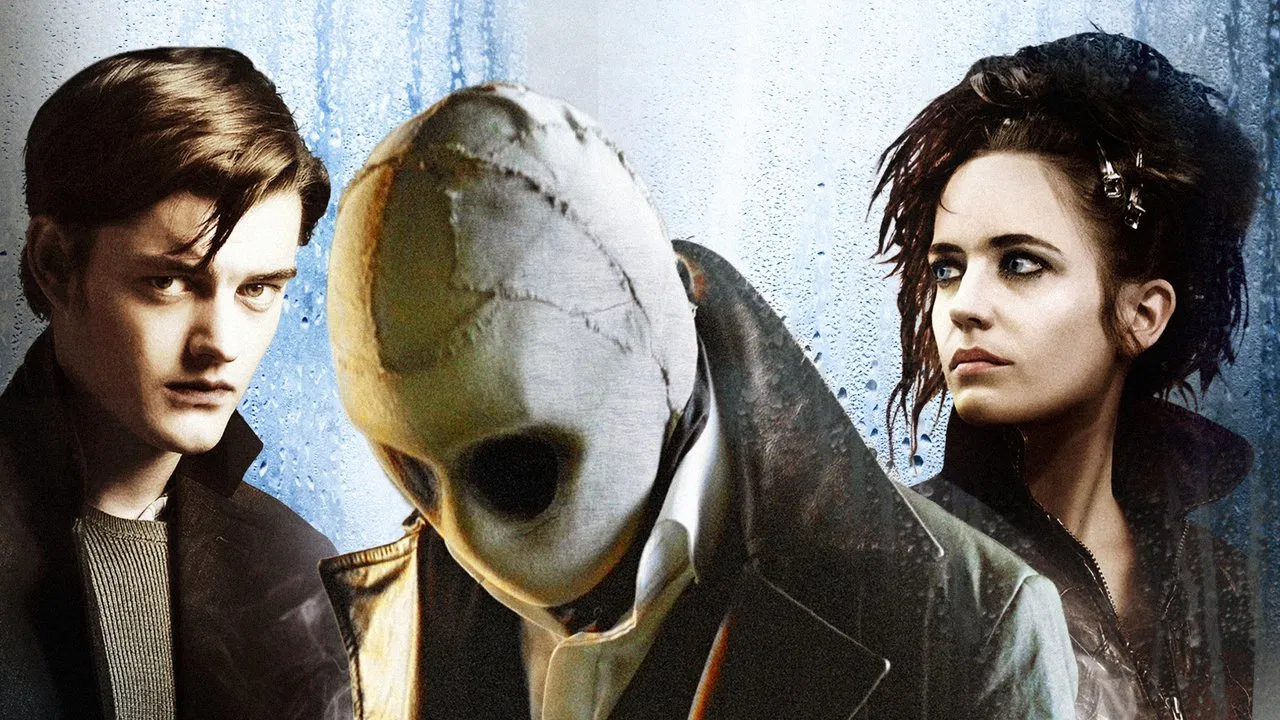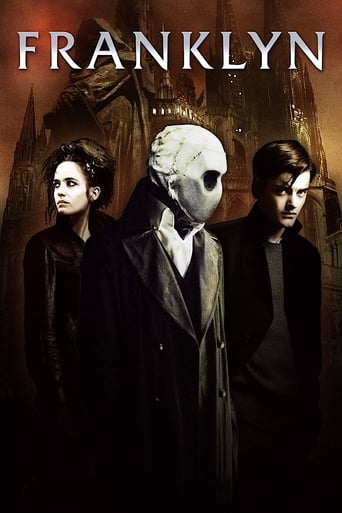

Let's be realistic.
... View MoreThe movie is wonderful and true, an act of love in all its contradictions and complexity
... View MoreAll of these films share one commonality, that being a kind of emotional center that humanizes a cast of monsters.
... View MoreThe thing I enjoyed most about the film is the fact that it doesn't shy away from being a super-sized-cliche;
... View MoreThis movie has the potential to be one of my favorite movies. here is why I hate it instead: The movie starts out like a fantastic, mesmerizing, amazing steam-punk/fantasy world/masterpiece and in addition there are some great, clever lines about religion that I can only highly agree with, but soon the viewer realizes, that the story takes place in the normal world instead - that's it with the great setting/the great Meanwhile City, poof and gone. Instead it is a regular garden variety crime story/drama and not just that, it turns out to be a story of immense injustice - what naive characters may consider romantic is the proof that this world is a heap of BS: that stupid Milo gets the happy ending, why? And why not David? David is not a bad man, on the contrary, and he is the one who can not be lulled (he recognizes the Theodicy dilemma (If a god is willing to prevent evil, but not able, then he is not omnipotent. If he is able, called but not willing, then he must be malevolent. If he is neither able or willing then why call him a god? Why else do bad things happen to good people?). He is just unlucky. He experiences evil / traumatic / unsettling/sickening experiences (the loss of the sister, war experiences, an annoyingly religious father - just think of: "It was God's will that our daughter died" -duh) and along with an unlucky, genetic predisposition to mental instability this makes him a condemned soul and his only way out is death, while fate brings other people a happy ending - that is pure injustice, depressing, unsatisfying, typical !! Not everyone's "life is too much of an adventure as it is without making anything else up" - blah blah, stupid chatter of lucky people, who understand nothing. -The ultimate injustice, a bullshit end - as David said it himself: "they neglect to see (...) the damage that fate causes so many in its selfish journey towards just one favorable consequence." Milo is the one favorable thing that happens and everybody else including/esp. David are the losers and have to suffer a cruel fate. Disgusting, depressing, I wish I hadn't watched it, I misjudged it, I was misguided by the nice pictures of Meanwhile city which the movie happily blasts away in the end.
... View MoreIn a parallel world, the dark and chaotic Meanwhile City is ruled and controlled by religious Powers That Be. The masked vigilante Jonathan Preest (Ryan Phillippe) seeks out the evil Mr. Tarrant (Bernard Hill), who has abducted the eleven year-old Sarah to force her to join the Duplex Ride sect. Preest uses the scum Wormsnakes (Stephen Walters) to find Mr. Tarrant to rescue Sarah. However he is betrayed by Wormsnakes and imprisoned along four years by the religious agents. He learns that Sarah was murdered and when he succeeds to escape from the imprisonment, he chases Mr. Tarrant to kill him and bring justice to Meanwhile City.In London, Emilia Bryant (Eva Green) is a suicidal that misses her father and despises her mother. Milo Franklyn (Sam Riley) is a young man that was left by his wife Karen and seeks comfort with his friends Dan and Laura. Milo has the sensation that he has seen his red-haired childhood sweetheart Sally (Eva Green) on the street and decides to go to his school to research Sally's address. However, he meets her at school and they schedule a date in a small restaurant. Meanwhile, Peter Esser (Bernard Hill) is seeking out his missing son David Esser (Ryan Phillippe), who is disturbed with the loss of his sister Sarah, and he meets Bill Wasnik (Stephen Walters) that gives an address to him. Peter goes to visit his son that is wanted by the police and waits for him in the same restaurant that Milo will meet Sally. The worlds of these characters are entwined with revelations about painful truths."Franklyn" is an intriguing and original movie about distorted minds protecting painful truths. The screenplay keeps the mystery until the very end and the visual concept of Meanwhile City is twisted like the mind of David Esser. Eva Green is impressively beautiful even performing a character without glamor. The beginning is hard to follow but if the viewer gives a chance, he or she will will not be disappointed. My vote is seven.Title (Brazil): "O Justiceiro Mascarado" ("The Masked Vigilante")
... View MoreWhat's FRANKLYN about? I doubt the scriptwriter even knows for sure, because this is a muddled and uninteresting would-be science fiction film that attempts to lift itself out of a genre to become a movie of real merit. It's deliberately quirky and obtuse, and annoyed me in much the same way as the similarly unappealing V FOR VENDETTA: I take an instant dislike to films that think they're better than they are.FRANKLYN tells the stories of four people who initially seem totally unconnected, although unsurprisingly it transpires that each story hooks up with the others in some way, shape or form. So far, so routine, so they decide to have one of the stories take place in a fantastic worldscape where everybody seems to have started up their own religion (probably the only interesting idea in the whole movie). In an attempt to keep viewers' attention, they also throw in some half-hearted fight scenes to keep things moving along.Frankly, I was quite embarrassed to be watching this. Eva Green, an actress I like very much, plays an utterly embarrassing role as a whacked-out art student and has to do some painfully silly (and once again pretentious) stuff. I felt quite sorry for her. While the fantastic world stuff is more fun than the mundane London scenes, the movie lacks interest, hinging too much on a plot twist that turns out to be not very good at all. None of the cast really shines: I've never been a fan of Phillippe and his performance here doesn't change that, while Bernard Hill gets almost nothing to work with. As for the overrated Sam Riley, all of his dull scenes could have been cut without making a jot of difference.Let's face it now: it takes substance to make a real movie, and a movie that's all style is never going to be successful. That's why FRANKLYN turns out to be a real bore.
... View MoreI am frankly surprised almost to the point of shock that so many people have such a hard time following this movie. It is very straight forward in its story telling. The only reason i can imagine anyone *not* following it is either (a) confusion by the mislabeling of this film as a science fiction film (its not, its a psycho-drama) OR (b) geekish yearnings to make the sci fi setting 'real'. The ironic thing about (b) is that those people who do twist the world in such a way are, in fact, illustrating what this movie is all about-- which is the human ability to divorce ones perceptions from reality. The main characters exist in a spectrum of dissociation. (1) David/Jonathan Priest is a recently returned war veteran who is dealing with the trauma of the senseless death of his baby sister. Of all the characters, he is the most disassociated from reality-- to the point where he has created an entirely divergent internally-consistent reality for himself. We would call such a person "dissociative" or "psychotic" normally, but this movie shows him not as unique but merely as an extreme in a continuum of human behavior. (2) Milo created a fantasy friend. "Sally", as a child to cope with the death of his father. To him, Sally is part of his reality, a part that again is only part of his own perceptions. When his life hits a crisis of loneliness in the loss of his fiancée, he brings Sally back into his world. Again, we would view this as a lesser form of disassociation/psychotic break by our normal yardsticks. But there are even more shades here. (3) Emelia has also created a break with reality because of trauma, in this case her childhood abuse (sexual is suggested but never totally stated) by her father. Choosing to forget that and remember it as stories, not reality, she has substituted a desperate longing for a father that she thinks she lost, though chances are he never really existed as she remembers him. Rather then blame herself for the sexual abuse (as victims commonly do) she has substituted a blame of her mother for "taking her father away." She acts out her inner turmoil and attacks her mother through staged "art" suicides. It could be argued that these are also her attempts on some level to punish herself, but thats never developed in the movie. Nonetheless it generally takes either severe depression or severe guilt to bring one to the brink of suicide. (4) David's father has the same trauma that David has-- the traffic accident death of his daughter, David's little sister, In his case, he is clinging to a hard line religious explanation. That it was God's will and God's actions. This gives a senseless and horrible death, a little girl struck down by a car, meaning and allows him to deal with it. It can be argued however that this TOO is a disassociation from the reality that random horrible things happen without purpose or reason. That is a reality that many people we would consider "normal" to flee from and make up stories to hide behind instead. And in the end thats what this movie is about, as explained in the "story" that "Sally" tells Milo about the story teller who built a perfect world, but in the end walked away from it because it wasn't real. And the real and only question this movie leaves is that: what stories do WE live in rather then dealing with reality, and which is really better? Is believing in a cold, uncaring, random world more healthy just because it is "real"? or do we as human beings by our very nature live in worlds of fantasy in order to function? As for the final shot of the bucket and mob without the janitor by it, that is open for debate, but I see it as a "tease".. daring US to interpret the janitor's part in the film not as just one more random element in a random world, but as something with deeper and perhaps mystical meaning. The author leaves that for us, the viewers, to weave fantasies about.
... View More